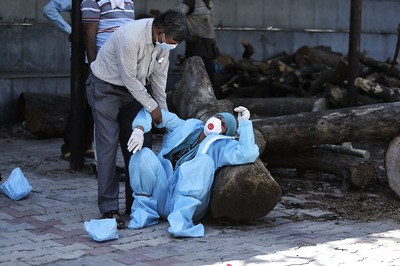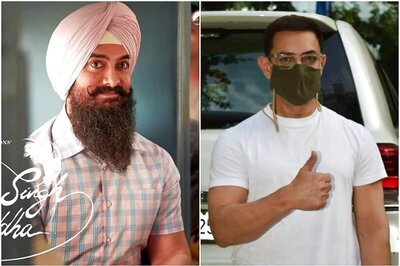
views
Velvet Buzzsaw
Cast: Jake Gyllenhaal, Rene Russo, Toni Colette, Zawe Ashton
Director: Dan Gilroy
After taking a jab at sensationalist news media culture with Nightcrawler (2014), filmmaker Dan Gilroy is now aiming his guns at the connoisseurs of the installation art circuit. Jake Gyllenhaal, Rene Russo, Toni Colette, Zawe Ashton and John Malkovich star in Dan’s latest venture, Velvet Buzzsaw, with the sole purpose of falling victims to the writer-director’s half-baked vision and an uninspired attempt at a slasher-thriller, supernatural-horror film. His method: death by art.
Morf Vandewalt (Jake Gyllenhaal) is an uber-stylish, seasoned, icy art critic. He changes his clothes everyday, but never his opinion of mediocrity. He swifts through galleries; his right shoulder a little bent, with a ‘backed-up’ posture that is meant to separate him from associating with people eternally.
Morf’s only relationship is with his job, which is mostly to smother people’s career with his judgment on their work. He knows of the power of opinion that he wields and the celebrity-status that he has acquired in its wake. Consequently, he is no mood to right his wrong anytime soon.
Josephina (Zawe Ashton), as she starts out, is an assistant at a gallery. She fosters the dream of becoming rich and successful, but is unwilling no make an effort in the direction. She is an aimless woman, caught up in a middle of a career, drinking away her fear and failure, one day at a time.
Since its too late now to look for another way out, she just sulks up her frustration and swallows the ignominy of being cheated on, lied to and talked down to, again and again. However, as an enterprising woman, she does not shy away from striking up working relationships with people in the business, while chasing the blind hope forever that things might change for her.
Rhodora (Rene Russo) is a successful gallery owner, an associate of Morf’s and Josephina’s. Her recent ventures include poaching new artists for her exhibit. We gather that she was probably once an artist herself, but has now moved into the realm of supporting up and coming performers. She is a smart and an articulate woman who could change the world of art forever, but is caught up in her own little games that are a means to no end.
Dan presents us with this canvass of disgust evoking and empathy-lacking snobs in the start of the film, setting the stage for what could have been an enjoyable killing-spree of the said ivory-tower-dwelling-citizenry. The intent however is reduced to making a mockery of these characters that benefit from the work of artists, even dead ones.
In a turn of events, Josephina discovers prolific artwork of a deceased, psychopathic painter in her rented building, by the way of being at the right place, at the right time. Now, by the confession of various industry workers and even Morf himself, Vetril Dease’s art is mesmeric, thought provoking and visionary.
Inspired in his or her own cunning ways, everyone wants a piece of Dease now. Rhodora wants to commission his work under her brand, pointing out to Josephina in the way that she is incapable of curating and selling it.
Morf wants to write a book about this mysterious artist, hoping that it would give him a chance to begin something that is more productive, ‘long-form’ and ‘beyond opinion’. Josephina has no immediate plans but to become consenting party to Rhodora and Morf, while she benefits from the sales of the Vetril’s paintings.
In fact, she is the first one to acquire visible changes by the virtue of making money off Vetril’s work. She moves to a bigger apartment, with silk sofa seats and changes her wardrobe completely. For someone who appears to be a sad tale during the first half of Velvet Buzzsaw (reflected in the choice of clothes and their colours), she moves to wearing vibrant colours during the second half.
Her social standing has also gone for an upgrade. From working Rhodora’s desk job, that too terribly, she moves to a position of being at an equal standing with her. At least that is what Rhodora would have her believe. Josephina’s boredom in life, with things and people, reflects on her face. Her character arc is fleshed out and complete.
Rhodora wants to market Vetril’s work to maximise her gains. Like a true businesswoman, she creates a demand and supply mismatch so that her, and the value of her brand increases. She even hires an investigator to dig up dirt on the late Vetril, who destroys incriminating evidence to further her cause. She is manipulative and smart in equal measure and its no surprise that her death is the most unpleasant and even undesired.
For somebody who is initially loathsome, Morf has our sympathies, but only towards the end. Gyllenhaal has portrayed the character of Morf by absorbing in cultural nuances of this high maintenance, bisexual- art critic to his sincerest. He is delightful in his mannerisms and even speaks the part. Morf uses a critique’s language in day-to-day conversations. “I was floating in the ocean, and for this incredible moment, it felt like I had tapped into primal consciousness,” he says when talking to Josephina at a party.
The supporting cast includes Toni Collette (Gretchen), Tom Sturridge (Jon Dondon) and Billy Magnussen (Bryson). They further the cause of distancing us, the viewers, from the narcissistic world of art collectors and exhibitors. It’s no fun when they die, because we know they had it coming. The way they meet their fate is however, boring. John Malkovich is a surprise in his visible indifference for everyone, except his dog, and it only benefits him to turn maniacal in the end.
Credit to cinematographer Robert Elswit who does this incredible thing with the establishing wide-angle shots and aerial drone shots. The images are like painting themselves, which further reinforces the idea that the characters are trapped into a world of their own making. Music by genre veterans Marco Beltrami and Buck Sanders makes the tension palpable with creative sound design. Background tune gets distorted, pleasant, scary and comical as the narrative flows.
Despite strong characterisation and technical prowess, the story is drab. We know what’s going to happen, before it happens. The trick is to make it worth the wait. The characters hold us with them till that time, each with their unabashed performance, but then the plot gets absorbed in its unoriginality and mundaneness. Its nowhere as good as Nightcrawler was, which also had Gyllenhaal and Russo in the lead roles. It was inspired and spiteful. This one is vindictive, but to no amusing end.
Rating: 2/5
Follow @News18Movies for more




















Comments
0 comment